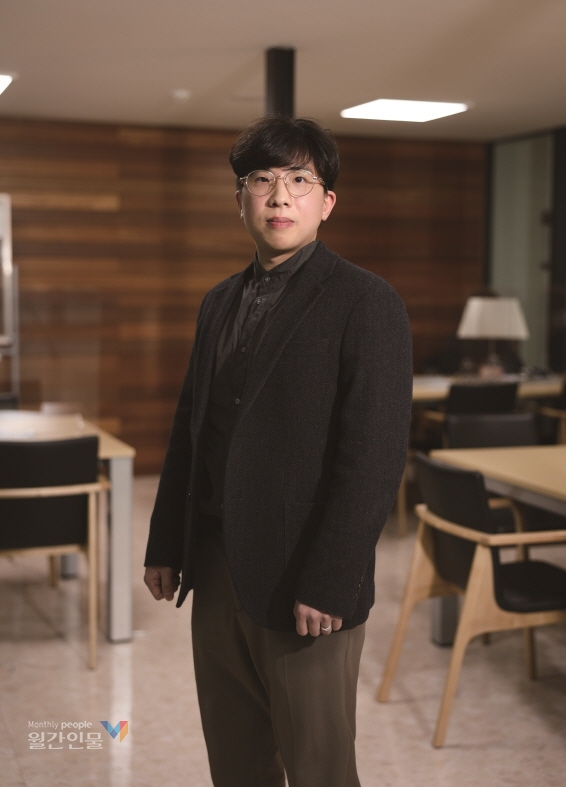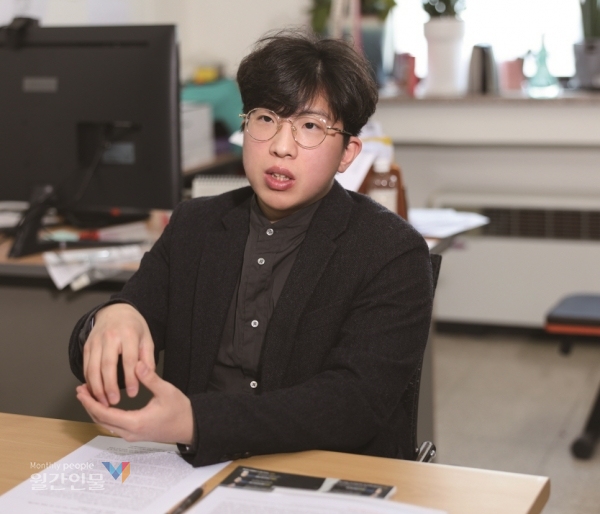-
Designated as Excellent New Research Support ProjectAuthor : 관리자Date : 2022.05.11Hit : 444
-

Maximizing EMR data value by constructing a system for acute disease prediction based on EMR data
Professor Kim Gang-min of the Data Science Department at the Catholic University of Korea was selected as an excellent research support project for the “Individual Research Support Project in the First Half of 2022”, which was selected and supported by the Ministry of Science and ICT and the National Research Foundation. Research on the issue of “E-medical record-based acute illness prediction system utilizing self-supervised learning” will continue for the next three years. Even more significant is the fact that this was accomplished within six months of being recruited after finishing the PhD program in February of last year.
“Interest in health has increased recently. In addition to increased access to medical care and a rapidly aging population, the utilization of medical services is on the rise. However, the number of cases resulting in medical disputes is on the rise as a increasing number of patients die due to unforeseen symptom deterioration in the medical field. Numerous fatalities result from the abrupt onset or deterioration of symptoms such as heart attack, ventricular fibrillation, shock, sepsis, and respiratory failure.”
Professor Kim worked on EMR to avoid sudden mortality due to fast deterioration of health. EMR is a digital medical record that holds a patient's personal information, medical history, examination results, prescription records, treatment outcomes, surgical data, and hospitalization/discharge records. Due to the fact that all illnesses and treatments associated to the patient are documented in chronological order, it might serve as a good predictor of the patient's health condition. Professor Kim stated that Korea's EMR penetration rate is 92%, the highest in the world, and that more people may be saved if EMR is utilized efficiently.
“EMR is a reservoir of medical data, but the variety of ailments, prescription medicines, and surgical procedures is extensive. And in many cases, these are stored as unstructured data without standardization such as natural language (free text) and abbreviations. This is the reason why it is challenging to identify variables that may be utilized as significant indicators to construct predictive models. Therefore, I believed that natural language processing specialists such as myself may be useful in analyzing EMR data.”
Professor Kim prioritized the thorough processing of structured data, such as test values, and unstructured data in the form of text and pictures, such as medical records and medical photographs, while developing the AI-based EMR data analysis methodology. This is why EMR-recorded data such as different test records, medical records, and medical and pathological images must be fully perceived and evaluated by medical professionals. To this end, self-supervised learning technology was used. Self-supervised learning, in contrast to the prevalent supervised learning, refers to the technique of self-learning without a human-determined solution. Professor Kim explained that he hopes to maximize the performance of predicting the onset of acute sickness by empowering AI with EMR-based self-directed learning.
“Using EMR, we aim to save even one more precious life by early prediction of potentially fatal acute illness. Currently, EMR data are not exploited globally to its fullest potential. This project aims to create the groundwork for optimizing the utilization of EMR data.”A specialist in natural language processing who has investigated large-scale text categorization and micro-artificial intelligence
Professor Kim Gang-min, who presently directs the Natural Language Processing (NLP) laboratory at the Catholic University of Korea, has conducted doctorate research in the subject of artificial intelligence known as natural language processing. The goal of natural language processing is to enable artificial intelligence to comprehend and communicate in human language. During his doctorate program, Professor Kim's research on large-scale text categorization and On-device AI yielded world-class results, and he participated in the greatest and most prestigious international academic conferences on artificial intelligence, such as WWW, EMNLP, and ACL, and published 17 papers (as a lead author in 5 papers). In this regard, he seems to be earning acknowledgment for his research accomplishments, such as receiving the best paper award from the Korea University College of Information and the Information Sciences Association of Korea, and a fellowship from Naver, the local leader in artificial intelligence. He has also served on the program committees of the most prestigious academic conferences in the field of artificial intelligence, including AAAI, ACL, and NAACL.
Large-scale text classification involves classifying diverse materials into thousands or tens of thousands of subjects. Beyond broad categories such as politics, sports, and science, sports are subdivided into specific issues such as baseball/major league/team/LA Dodgers. When developing a recommendation system or chatbot, this source technology may be leveraged to fully comprehend customer preferences. Micro AI is gaining traction as a technology that can alleviate the problem of privacy invasion caused by artificial intelligence, which has become an issue recently. The prevalent AI model is currently too huge, so it has to be stationed on a high-performance server. As a result, in order for consumers to utilize intelligent services, their personal information must be communicated to the server, which may result in an invasion of privacy. Professor Kim said that micro AI may function stand-alone within a smart gadget, allowing customers to experience the benefits of intelligent services while maintaining their privacy. Through a variety of industry-university collaborations, he actually demonstrated technologies that users can experience.“Since my appointment to the Catholic University of Korea, there have been several requests for collaborative research and development on medical AI. I determined that, as a data scientist, I would undoubtedly have something to contribute to the medical industry, so I began researching EMR-based illness prediction. We have turned the focus of our research towards the development of artificial intelligence technology that process natural language which can recognize abbreviations and synonyms, and even forecast illnesses.”
To date, research has been undertaken to forecast diseases based on standardized data such as blood tests, but there were no studies for predicting acute diseases with high probability by comprehensively recognizing atypical data. Professor Kim stated that he determined the deep learning technology, which had previously been researched for large-scale text categorization and micro AI, would serve as the foundation for the creation of EMR-based illness prediction models. This study was conducted with the expectation that if acute diseases can be predicted early, it will be of great help in reducing mortality and saving lives.
“My colleague professors are really helpful in the development of medical artificial intelligence. Their extensive medical expertise has been immensely helpful. The ability to access patient data from the Medical School and St. Mary's Hospital is another benefit of being affiliated with the Catholic University of Korea.”
A researcher who follow the steps of “what you seek is seeking you”Professor Kim Gang-min presently serves as the director of the AI Campus Research Center at the Catholic University of Korea, where he develops “AI Seniors” for students. He explained that he is developing an artificial intelligence capable of recommending curriculum to students, editing portfolios, and providing career guidance. The research will be conducted over the course of three years, and this year, a technology to identify students who exhibit early signs of dropping out will be developed. AI Seniors is anticipated to check school-related difficulties and help students solve issues by informing their advisers of pertinent information and providing consultation. In addition, he intends to continue research on the technology that identifies the political slant of news stories, which he conducted before to his employment. He developed this in the hopes that readers who have not yet determined their political leanings would refer to the content of the article based on its political bias. Professor Kim stated that he intends to complete research on the technology by the end of this year.
Industry-academic projects are also active. In addition to establishing a heart disease prediction model for companion animals with IntoCNS, he began developing a kiosk for the disabled through cooperative research with the kiosk business Order Queen. Professor Kim explained that he is developing a voice-activated ordering kiosk by using a voice chatbot for those in wheelchairs and others with difficulty touching the display.
“I believe in the idiom "what you seek is seeking you." If I have a goal, I tell everyone around me and motivate myself. It appears that if I work hard to accomplish what I have said, I get to utilize 120% of my capability.”
This conviction was likewise transmitted to the students. Professor Kim, who believes it is crucial to have a goal, says that if you have a goal you wish to accomplish, you should not be afraid to share it with others and live a life in which you strive to attain it. This is because a large number of students who have selected a new department called Data Science are complaining about challenges caused by the nature of artificial intelligence, which necessitates many skills like mathematics, statistics, and programming. Professor Kim said that artificial intelligence data science is a very promising profession, and if you study sufficiently with self-assurance, you will be landed a job with a significant amount of meaning and monetary compensation. Additionally, he was intent on training qualified data scientists himself.Fostering data scientists as a professor who cares for his students
Professor Kim Gang-min was greatly influenced by his father, who worked as the research director of Kookmin Bank and adjunct professor outside of Chung-Ang University. His father, who had taught Monetary and Financial Economics at Chung-Ang University for ten years, would frequently tell Professor Kim about his students. Whenever Professor Kim faced his students, he was reminded of his father, who was proud of his student developments as if they were his own. His dedication to his students was honored by the Stone Tower Lecture Award and Excellent Course Selection from Korea University.
“On the first day of graduate school, my father passed away. I was the chief mourner at the funeral home, and someone I've never met before was somberly weeping. When I saw the guest book, I realized that he was one of my father's students. Realizing that my father's love for his students was reciprocal, I resolved to become a professor who likewise loves his students.”
Professor Kim outlined three criteria for selecting a career that were imparted to him by his father. A good career is one that provides meaning, enjoyment, and money. He was determined that artificial intelligence is a field with all three characteristics. Explaining that it is a job one can enjoy and find meaning in the application of the technology to new domains, such as medical care, autonomous driving, and robots by developing artificial intelligence for humans, he expressed the hope and encouragement that more students would persevere and reach their goals. It is anticipated that the era of big data that Professor Kim's research and his students will create by developing meaningful indicators from the avalanche of data and transforming people's lives.Source: Monthly People
-
Attachment File

